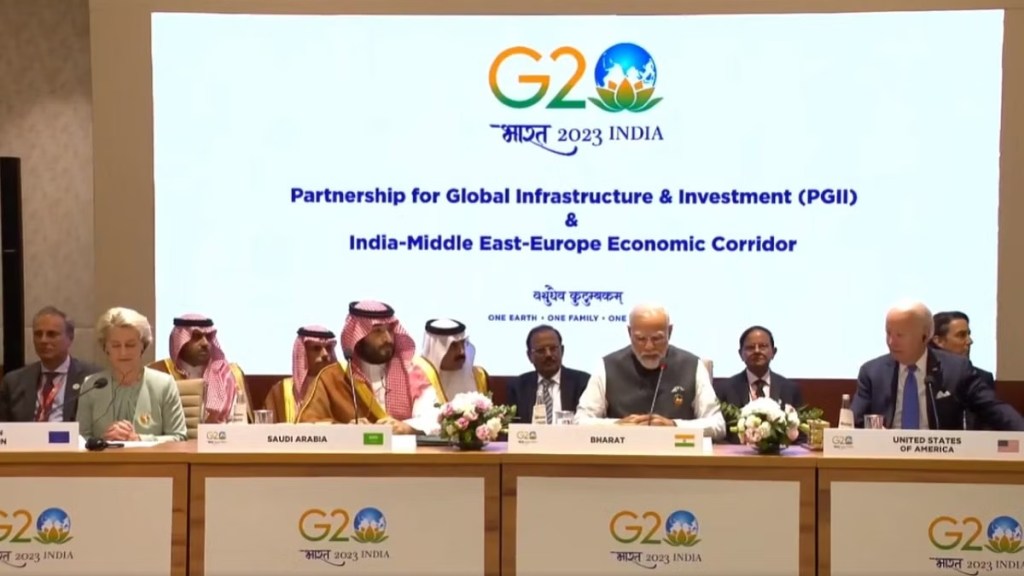By Dr Lakshmi Priya
Signing of the Memorandum of Understanding (MoU) on India-Middle East-Europe Economic Corridor (IMEC) by the USA, European Union, France, Germany, Italy, India, Saudi Arabia and the UAE during the 18th G20 summit will have various implications for the regional and global geo-politics. The corridor has the potential to stir existing political dynamics while emphasizing on the rising significance of the Middle East for Asia, Europe and the USA. It underlines the fact that the USA is willing to engage in the Arab world, Europe is assigning considerable attention to the region and India is ready to be the dependable partner. Also, IMEC is perceived as a counter to the China’s Belt and Road initiative (BRI) in the region, sheds light on the western isolation of Iran and indicates towards the warming of ties between Saudi Arabia and Israel.
With the potential to stimulate economic development through enhanced connectivity and economic integration between Asia and Europe, IMEC consists of two corridors-the eastern corridor will connect India to the Arabian Gulf and the northern corridor will connect Arabian Gulf to Europe. The corridor includes a railway line that will provide a reliable and cost-effective cross-border ship-to-rail transit for goods and services between India, the UAE, Saudi Arabia, Jordan, Israel, and Europe while supplementing the existing maritime and road transport routes. The railway link will also have an electricity cable, a high-speed data cable and a hydrogen pipeline for digital connectivity and green energy export respectively.
Belying speculations of withdrawal from the region, the corridor confirms Washington’s strong footing and unwavering presence in the Middle East. President Joe Biden said that the USA focuses on the regional infrastructure projects that deliver results across multiple countries and in multiple sectors and IMEC is a big deal and a game changing investment. He thanked the Saudi Crown Prince Mohammed bin Salman and the UAE President Sheikh Mohamed bin Zayed Al Nahyan. UAE attended the G20 meeting as an invitee country whereas Saudi Arabia and Turkey participated as member countries. It is to be noted that the US and EU also announced the “Trans-African Corridor” connecting the Angolan port of Lobito with landlocked areas in the mineral-rich countries of Democratic Republic of Congo and Zambia.
At the same time, the corridor is seen as a counter to China’s ambitious Belt and Road Initiative (BRI), when China has ramped up its active engagement in the region. Beijing’s mediation role in the Saudi-Iran deal has fostered its role as an important external actor in the region. Absence of the President of China and Russia in the G20 summit adds to the speculations that the corridor may undermine their position in the region. The corridor is also being seen opposed to the North South Transport Corridor in which Iran and Russia have made considerable investments. However, the Gulf countries claim that the corridor will lead to economic growth and development while enhancing connectivity along with emphasizing on the multipolar world.
Signing of IMEC also signals Europe’s increasing interests in the Middle East for energy security. The Ukraine crisis led to disruptions in the energy flow to Europe; as per the International Energy Agency report the European Union might face a potential shortfall of almost 30 billion cubic meters of natural gas in 2023. The signs of European countries cozying up to the Gulf countries have been visible in recent times. In May 2023, Italy had Italy announced last week a full and immediate end to its arms embargo on the United Arab Emirates, and a month later the French multinational energy and petroleum company TotalEnergy and the Saudi state-owned petroleum and natural gas company ARAMCO signed a $11 billion contract. Following that, Germany softened its position on arms exports to Saudi Arabia.
For India, the corridor opens new opportunities and possibilities to engage with the region. While being a credible and dependable partner for the regional countries, it is committed to the development of the region crucial for energy security and hosting more than 9 million Indian citizens. The corridor will not only connect the region like never before, but will also lead to digital connectivity and sustainable development. However, there are concerns like the vulnerability and political instability of the region. Currently the region is going through a state of reverie with deals and agreements giving a semblance of stability but the longevity of this phase is questionable. Secondly, the logistical issues like the poorly developed railways in Greece due to mountainous topography and the hot deserts of the Arab land will pose a challenge for the corridor. Thirdly, funding will be an important concern as not much has been put on paper regarding this; Saudi Arabia is expected to invest around $20 billion. Fourthly, since there are multiple stakeholders, chances of it picking pace are slim. Lastly, Israel is an important country for the success of IMEC and even though Riyadh-Tel Aviv are coming closer gradually, the likelihood for Saudi Arabia to sign Abraham accords is thin.
The author is Research Fellow, West Asia, Indian Council of World Affairs.
Disclaimer: Views expressed are personal and do not reflect the official position or policy of Financial Express Online. Reproducing this content without permission is prohibited.

